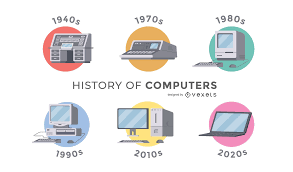
The History of Computers
Computers have come a long way since their inception, evolving from simple calculating machines to the powerful devices we rely on today. The history of computers is a fascinating journey that has revolutionized the way we live, work, and communicate.
The first mechanical computer, known as the Analytical Engine, was designed by Charles Babbage in the 19th century. This early computer laid the foundation for modern computing concepts and set the stage for further advancements in technology.
In the mid-20th century, electronic computers began to emerge with the development of ENIAC, considered to be one of the first electronic general-purpose computers. From there, computer technology rapidly progressed, leading to the creation of smaller, faster, and more powerful machines.
One of the most significant milestones in computer history was the invention of the microprocessor in the 1970s. This innovation paved the way for personal computers to become more accessible to individuals and businesses alike.
Throughout the decades, computers have continued to evolve with advancements in hardware and software technologies. The introduction of graphical user interfaces, networking capabilities, and cloud computing has further transformed how we interact with computers and access information.
Today, we live in a digital age where computers play a central role in nearly every aspect of our lives. From smartphones and laptops to supercomputers and artificial intelligence systems, the history of computers has shaped our world in profound ways.
As we look ahead to the future, it is clear that computer technology will continue to progress at a rapid pace, driving innovation across industries and reshaping society as we know it.
Exploring the Evolution of Computers: Key Questions Answered
- When was the first computer invented?
- Who is considered the father of modern computers?
- What was the significance of the ENIAC computer?
- How has computer technology evolved over time?
- What impact have computers had on society?
- What are some key milestones in the history of computer technology?
When was the first computer invented?
The first computer is often attributed to the Analytical Engine, designed by Charles Babbage in the 19th century. While this early mechanical computer was never completed during his lifetime, its conceptual design laid the groundwork for modern computing principles. Babbage’s work on the Analytical Engine is considered a pivotal moment in the history of computers, marking the beginning of a journey that would eventually lead to the development of electronic computers in the mid-20th century.
Who is considered the father of modern computers?
Often cited as the father of modern computers, Charles Babbage is a key figure in the history of computing. His groundbreaking design for the Analytical Engine in the 19th century laid the foundation for modern computing concepts and is considered a precursor to the general-purpose computers we use today. Babbage’s visionary ideas and contributions to the field of computer science have had a lasting impact on the development of technology and continue to inspire innovation in the digital age.
What was the significance of the ENIAC computer?
The ENIAC computer, developed in the mid-20th century, holds significant importance in the history of computing as one of the first electronic general-purpose computers. ENIAC revolutionized computation by introducing electronic components that enabled faster and more complex calculations than previous mechanical systems. Its ability to perform a wide range of tasks laid the foundation for modern computer technology and paved the way for further advancements in the field. ENIAC’s impact on scientific research, military applications, and technological innovation solidified its place as a pioneering milestone in the evolution of computers.
How has computer technology evolved over time?
Computer technology has undergone a remarkable evolution over time, transforming from simple mechanical calculators to sophisticated digital devices that are integral to our daily lives. The progression of computer technology has been marked by significant advancements in hardware and software, leading to smaller, faster, and more powerful machines. From the invention of the microprocessor in the 1970s to the development of artificial intelligence and quantum computing today, computers have become increasingly versatile and capable. This evolution has not only revolutionized how we work, communicate, and access information but has also paved the way for groundbreaking innovations across various industries. The continuous evolution of computer technology promises an exciting future filled with endless possibilities and opportunities for further growth and advancement.
What impact have computers had on society?
Computers have had a profound impact on society, revolutionizing the way we live, work, and communicate. The widespread adoption of computers has transformed various industries, enabling automation, increased efficiency, and access to vast amounts of information. Computers have also facilitated global connectivity through the internet, allowing people to communicate and collaborate across borders. Additionally, advancements in computer technology have led to innovations in fields such as healthcare, education, and entertainment, improving quality of life and expanding opportunities for individuals around the world. Overall, computers have played a pivotal role in shaping modern society and will continue to influence our lives in the years to come.
What are some key milestones in the history of computer technology?
Throughout the history of computer technology, there have been several key milestones that have shaped the evolution of computing. One significant milestone was the invention of the first mechanical computer, the Analytical Engine, by Charles Babbage in the 19th century. The development of ENIAC in the mid-20th century marked the emergence of electronic general-purpose computers. The invention of the microprocessor in the 1970s revolutionized computing by enabling the creation of smaller and more powerful personal computers. The introduction of graphical user interfaces, networking technologies, and cloud computing are also notable milestones that have transformed how we interact with computers and access information. These key advancements have paved the way for the modern computing landscape we see today.
